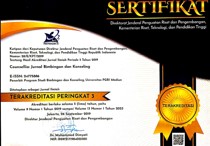Keefektifan Solution Focused Brief Counseling (SFBC) untuk menurunkan perilaku prokrastinasi akademik siswa
DOI:
https://doi.org/10.25273/counsellia.v9i2.4618Keywords:
academic procrastination, solution focused brief counselingacademic procrastination, solution focused brief counselingAbstract
Penelitian ini bertujuan untuk mengetahui keefektifan solution focused brief counseling (SFBC) untuk menurunkan perilaku prokrastinasi akademik siswa di kelas khusus olahraga SMP Negeri 2 Galur Kulon Progo. Jenis penelitian yang digunaan adalah Eskperimen dengan desain penelitian Pre-Eksperimental Design menggunakan model One group pretest posttest design. Penentuan subjek menggunakan teknik non probability sampling design dengan purposive sampling. Subjek penelitian adalah siswa kelas khusus olahraga SMP Negeri 2 Galur Kulon Progo. Berdasarkan hasil penelitian dapat disimpulkan bahwa ada perbedaan signifikan antara tingkat prokrastinasi akademik siswa sebelum dan sesudah diberikan layanan solution focused brief counseling (SFBC).
Â
Abstract
This study aims to determine the effectiveness of "solution focused brief counseling (SFBC)" to reduce the behavior of academic procrastination of students in the special sports class at Galur Negeri 2 Kulon Progo. Experiment with Pre-Experimental Design research design using One group pretest posttest design. Subjects are determined by using non probability sampling design with purposive sampling. The subjects of the study were students of the special sport class of JHS Negeri 2 Galur Kulon Progo. Based on the results of the study, it can be concluded that there are significant differences level of student academic procrastination between before and after being given solution services focused brief counseling (SFBC).Downloads
References
Ackerman, D. S., & Gross, B. L. (2005). My Instructor Made Me Do It: Task Characteristics Of Procrastination. Journal Of Marketing Education, 27(1), 5–13. DOI: https://doi.org/10.1177/0273475304273842
Baskoro, D. S. B. (2013). Model Solution Focused Brief Group Therapy untuk Perilaku Agresif Remaja (Phd Thesis). University Of Muhammadiyah Malang.
Corey, G. (2015). Theory And Practice Of Counseling And Psychotherapy. Nelson Education.
Ernawati, E., & Sumarwoto, V. D. (2016). Efektifitas Layanan Konseling Kelompok dengan Pendekatan Behavioral Melalui Teknik Shaping untuk Mengurangi Prokrastinasi Akademik Siswa Kelas VIII SMP Negerii 2 Barat Kabupaten Magetan. Counsellia: Jurnal Bimbingan Dan Konseling, 6(1), 41–53. DOI: https://doi.org/10.25273/counsellia.v6i1.456
Fadila, N. (2015). Penerapan Solution Focused Brief Therapy (SFBT) untuk Meningkatkan Keterbukaan Diri pada Siswa Kelas VIII SMPN 1 Prambon. Jurnal BK UNESA, 5(3).
Fauziah, H. H. (2015). Fakor-Faktor yang Mempengaruhi Prokrastinasi Akademik pada Mahasiswa Fakultas Psikologi UIN Sunan Gunung Djati Bandung. Psympathic: Jurnal Ilmiah Psikologi, 2(2), 123–132. DOI: https://doi.org/10.15575/psy.v2i2.453
Fernando, F., & Rahman, I. K. (2016). Konsep Bimbingan dan Konseling Islam Solution Focused Brief Therapy (SFBT) untuk Membantu Menyembuhkan Perilaku Prokrastinasi Mahasiswa. Jurnal Edukasi : Jurnal Bimbingan Konseling, 2(2), 215–236. DOI: https://doi.org/10.22373/je.v2i2.818
Fernando, F., & Rahman, I. K. (2018). Efektifitas Solution Focused Brief Therapy (SFBT) Islami Guna Meningkatkan Regulasi Diri Mahasiswa yang Mengalami Prokrastinasi. Journal Of Innovative Counseling: Theory, Practice, And Research, 2(02), 16–31.
Ferrari, J. R., Johnson, J. L., & Mccown, W. G. (1995). Procrastination Research. Procrastination And Task Avoidance (Hlm. 21–46). Springer. DOI: https://doi.org/10.1007/978-1-4899-0227-6_2
Ghufron, M. N., & Risnawita, R. (2010). Teori-Teori Psikologi. Yogyakarta: Ar-Ruzz Media.
Knaus, W. J. (2002). The Procrastination Workbook: Your Personalized Program for Breaking Free From The Patterns That Hold You Back. New Harbinger.
Munawaroh, M. L., Alhadi, S., & Saputra, W. N. E. (2017). Tingkat Prokrastinasi Akademik Siswa Sekolah Menengah Pertama Muhammadiyah 9 Yogyakarta. Jurnal Kajian Bimbingan Dan Konseling, 2(1), 26–31. DOI: https://doi.org/10.17977/um001v2i12017p026
Oematan, C. S. (2013). Hubungan Antara Prokrastinasi Akademik dan Prestasi Akademik pada Mahasiswa Fakultas Psikologi–Universitas Surabaya. Calyptra, 2(1), 1–7.
Popowiranta, A., Widiastuti, R., & Mahfud, A. (2019). Penggunaan Solution Focused Brief Counseling (SFBC) untuk Mengurangi Prokrastinasi Akademik Siswa. ALIBKIN (Jurnal Bimbingan Konseling), 7(2). DOI: https://doi.org/10.26740/bikotetik.v2n1.p93-99
Rusandi, M. A., & Rachman, A. (2014). Efektifitas Konseling Singkat Berfokus Solusi (Solution Focused Brief Therapy) untuk Meningkatkan Self Esteem Mahasiswa Program Studi Bimbingan Konseling Fkip Unlam Banjarmasin. Al’Ulum, 62(4).
Saputra, W. N. E. (2015). Perbandingan Prokrastinasi Akademik Siswa SMK Melalui Penerapan Teknik Cognitive Restructuring Dan Cognitive Defusion. Disertasi Dan Tesis Program Pascasarjana UM.
Savithri, J. J. (2014). Interactive Effect Of Academic Procrastination and Academic Performance On Life Satisfaction. International Journal Of Science And Research, 3(3), 377–381.
Senecal, C., Koestner, R., & Vallerand, R. J. (1995). Self-Regulation And Academic Procrastination. The Journal Of Social Psychology, 135(5), 607–619. DOI: https://doi.org/10.1080/00224545.1995.9712234
Solomon, L. J., & Rothblum, E. D. (1984). Academic Procrastination: Frequency and Cognitive-Behavioral Correlates. Journal Of Counseling Psychology, 31(4), 503. DOI: https://doi.org/10.1037//0022-0167.31.4.503
Sumarwiyah, S., Zamroni, E., & Hidayati, R. (2015). Solution Focused Brief Counseling (SFBC): Alternatif Pendekatan dalam Konseling Keluarga. Jurnal Konseling Gusjigang, 1(2). DOI: https://doi.org/10.24176/jkg.v1i2.409
Wiyono, B. D. (2015). Keefektifan Solution-Focused Brief Group Counseling untuk Meningkatkan Motivasi Berprestasi Siswa Sekolah Menengah Kejuruan. JKI (Jurnal Konseling Indonesia), 1(1), 29–37.
Yusak, M. (2014). Korelasi Religiusitas dengan Prestasi Akademik. Jurnal Intelegensia, 3(1).
Downloads
Published
Issue
Section
License
In order to be accepted and published by Counsellia: Jurnal Bimbingan dan Konseling, the author(s) submitting the article manuscript should complete all the review stages. By submitting the manuscript the author(s) agreed to the following terms:
The copyright of received articles shall be assigned to Counsellia: Jurnal Bimbingan dan Konseling. The intended copyright includes the right to publish articles in various forms (including reprints). Counsellia: Jurnal Bimbingan dan Konseling maintain the publishing rights to the published articles.
Authors are allowed to use their articles for any legal purposes deemed necessary without written permission from Counsellia: Jurnal Bimbingan dan Konseling with an acknowledgement of initial publication to this journal.
Author sent the copyright transfer form (here) to the journal.

This work is licensed under a Creative Commons Attribution-NonCommercial-ShareAlike 4.0 International License.






